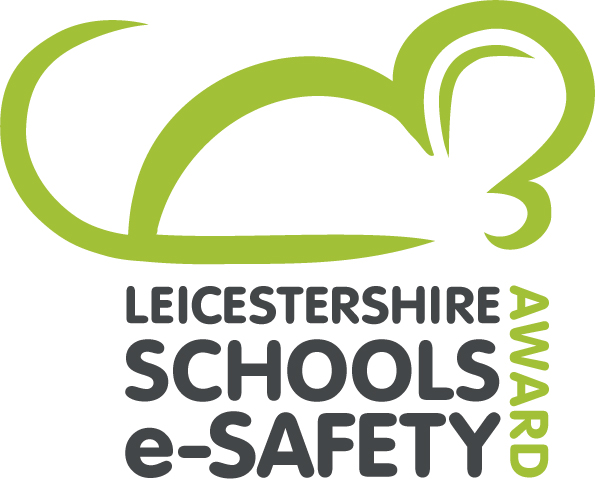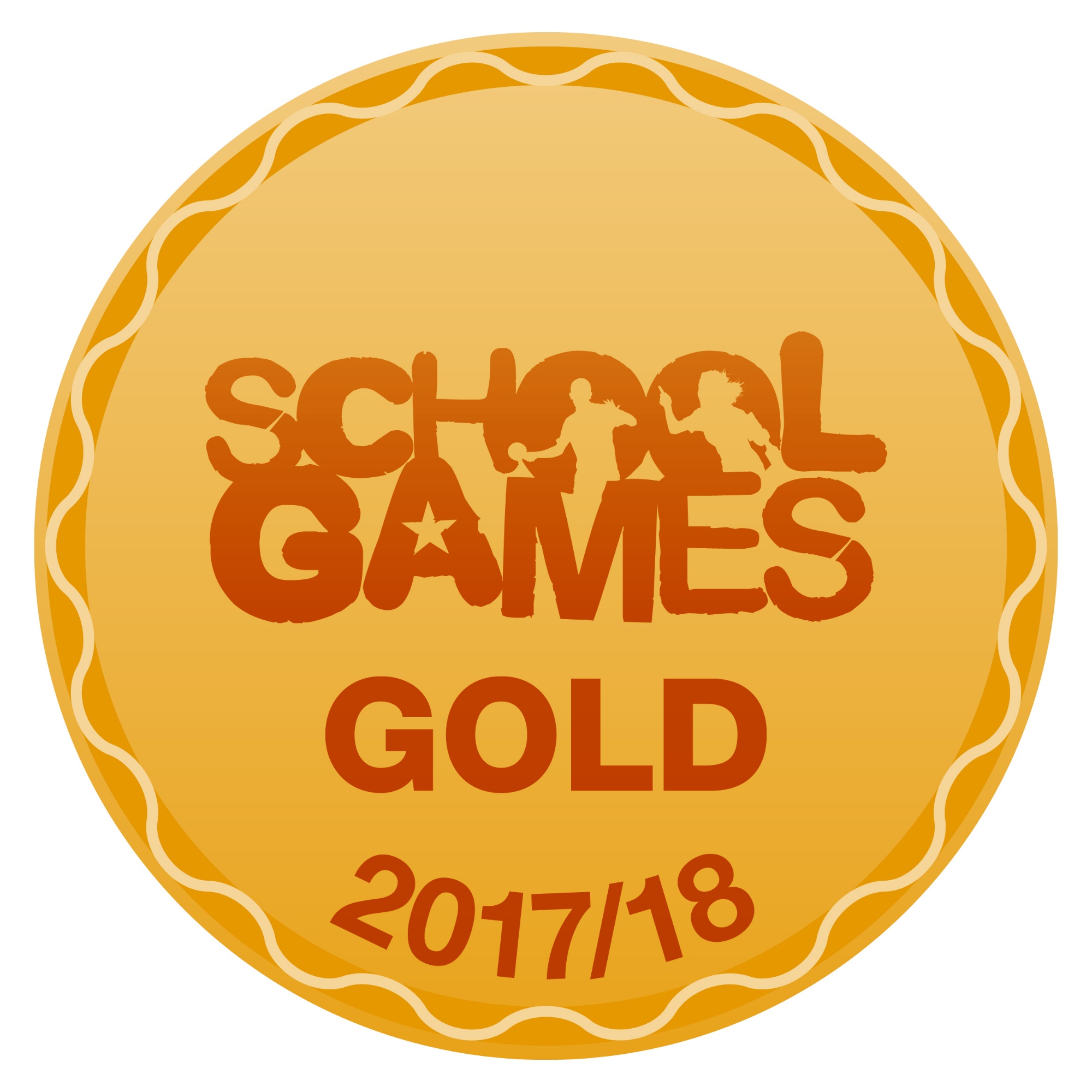MFL French
Together We Make Learning A Memorable, Unmissable Adventure
Intent
We want children to feel that they are language learners. We want all learners to reach the expected national curriculum standard by the end of year 6 and to be keen to continue their studies in key stage 3 and beyond.
The Language lesson should be one our learners look forward to and greet with enthusiasm.
Through studying a language, learners will draw on their developing learning habits, making progress in their ability to persevere, work as a team, respect and celebrate difference, ask questions and create.
Implementation
The National Curriculum is fully in place at Newton Burgoland Primary School.
At Newton Burgoland Primary School we use the Primary Language Network to support teaching and learning in French. The scheme was chosen at the start of this year as it is suitable for both experienced language teachers and teachers new to teaching French. We have liaised with our feeder schools to ensure that pupils are ready to start their language lessons at key stage 3 where they will use dynamo French (TMBS).
Lessons are interactive and long-term memory of learned vocabulary is built through retrieval practice. Cognitive overload is avoided with small steps progression and practise. The learning of phonics and grammar is included within the scheme as is an appreciation of French culture.
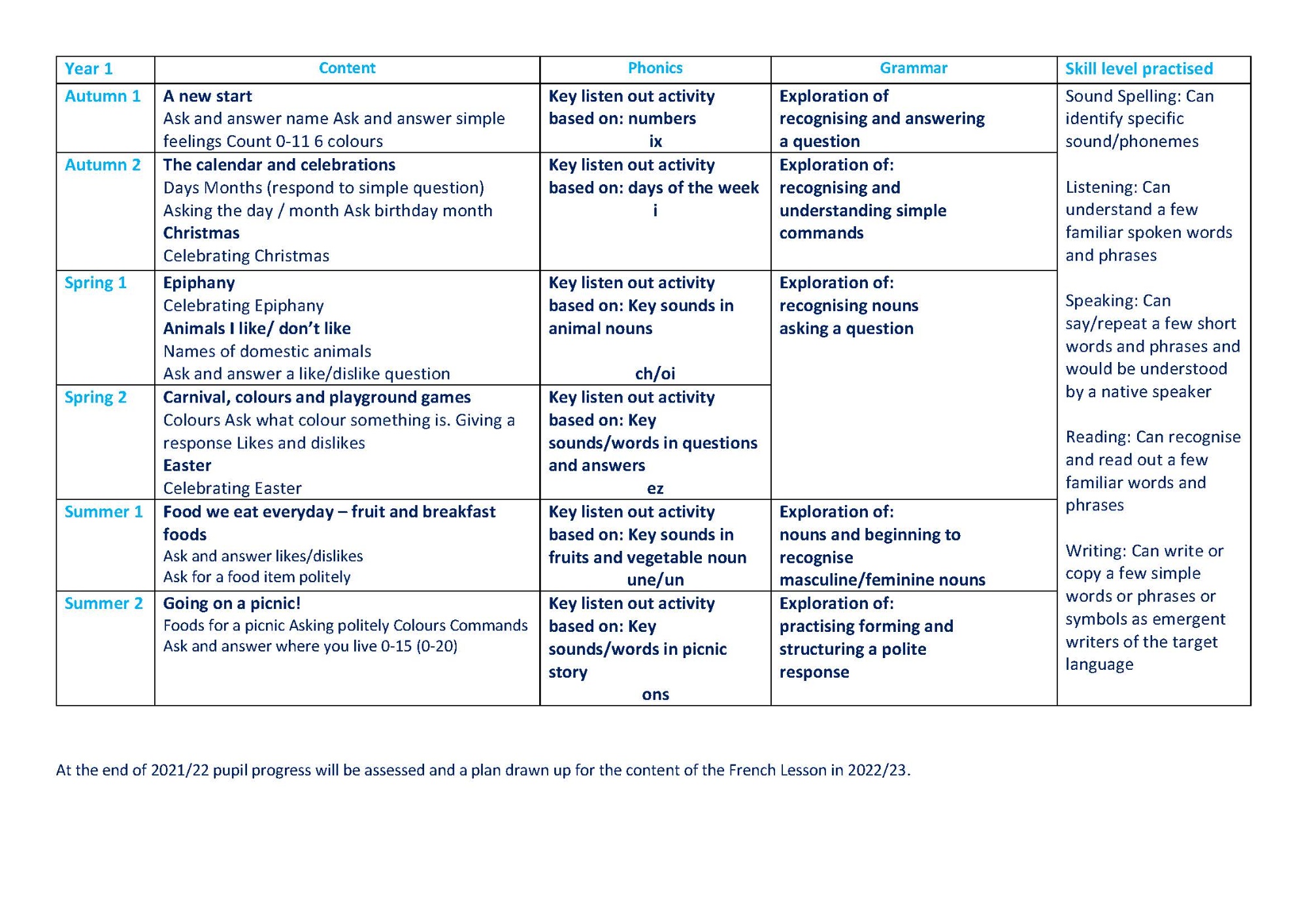
This our first year using The Primary Language Network. In 2022/23 the above content will be taught to year 2 and year 3. The content below will be taught to Year 4, 5 and 6:
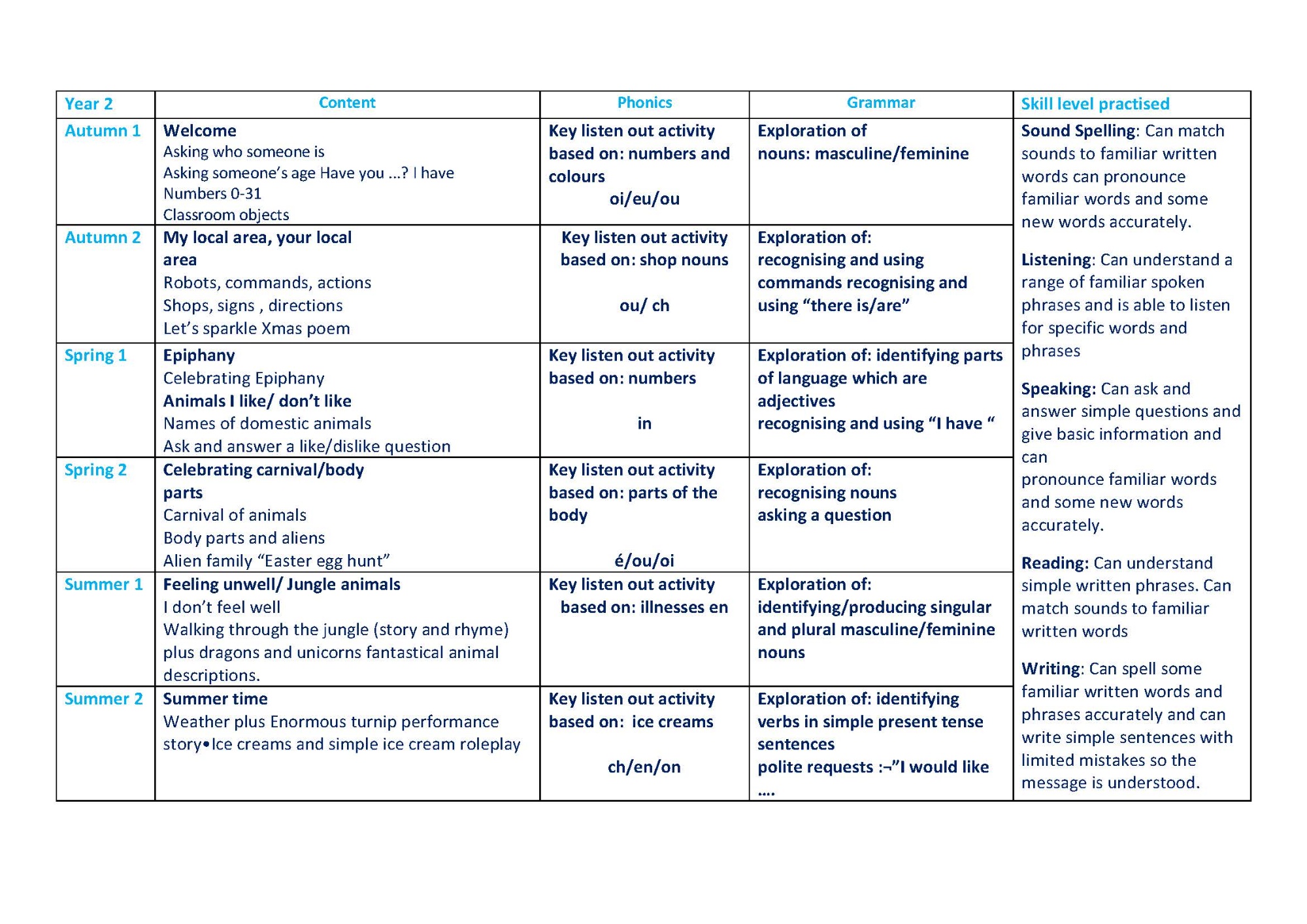
In 2023/24 year 3 and 4 will follow the year 2 plan and year 5 and 6 the year 3 plan.
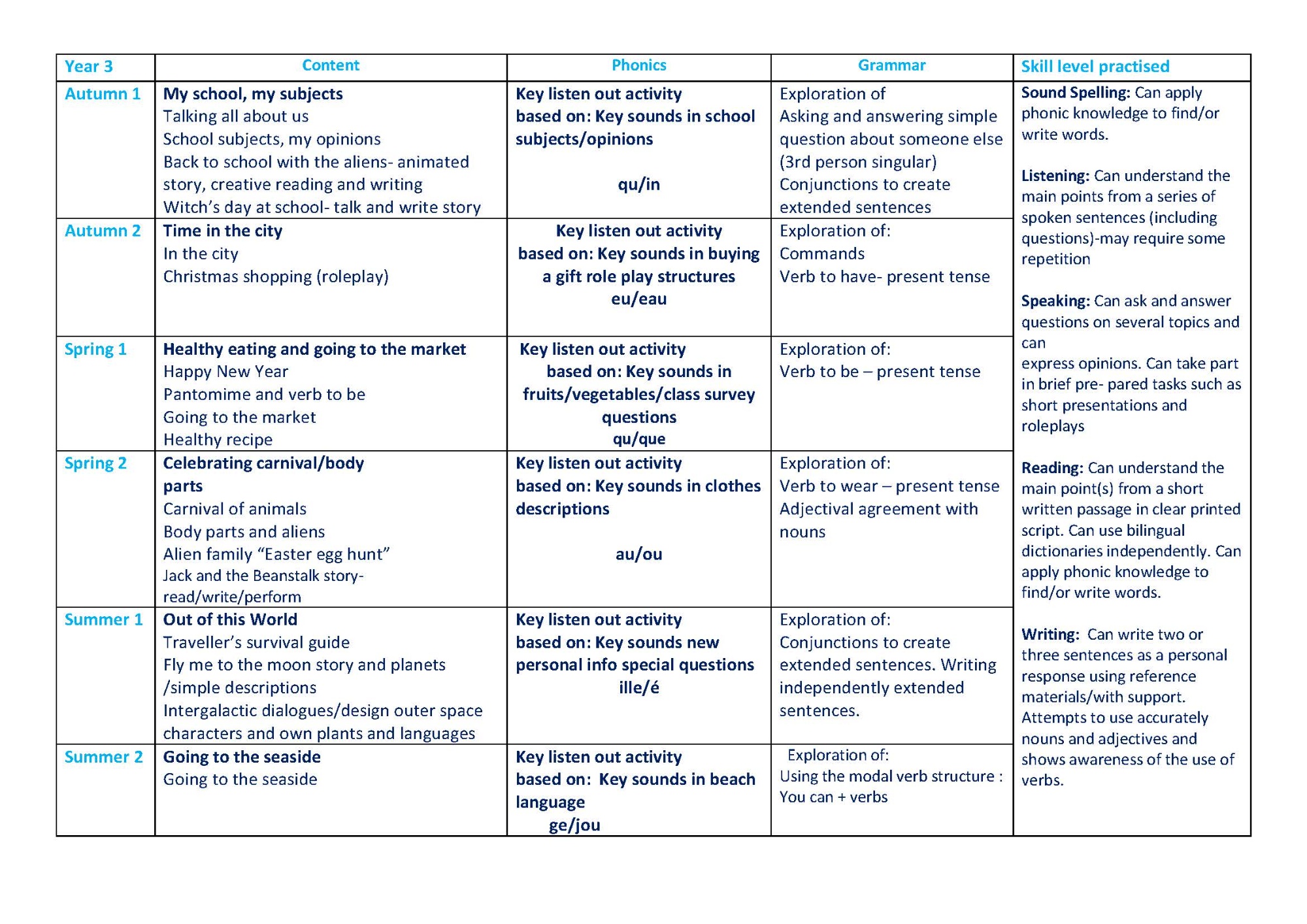
In 2024/25 Year 2 and 3 will follow Year 1, Year 4 and 5 Year 3 and Year 6 year 4.
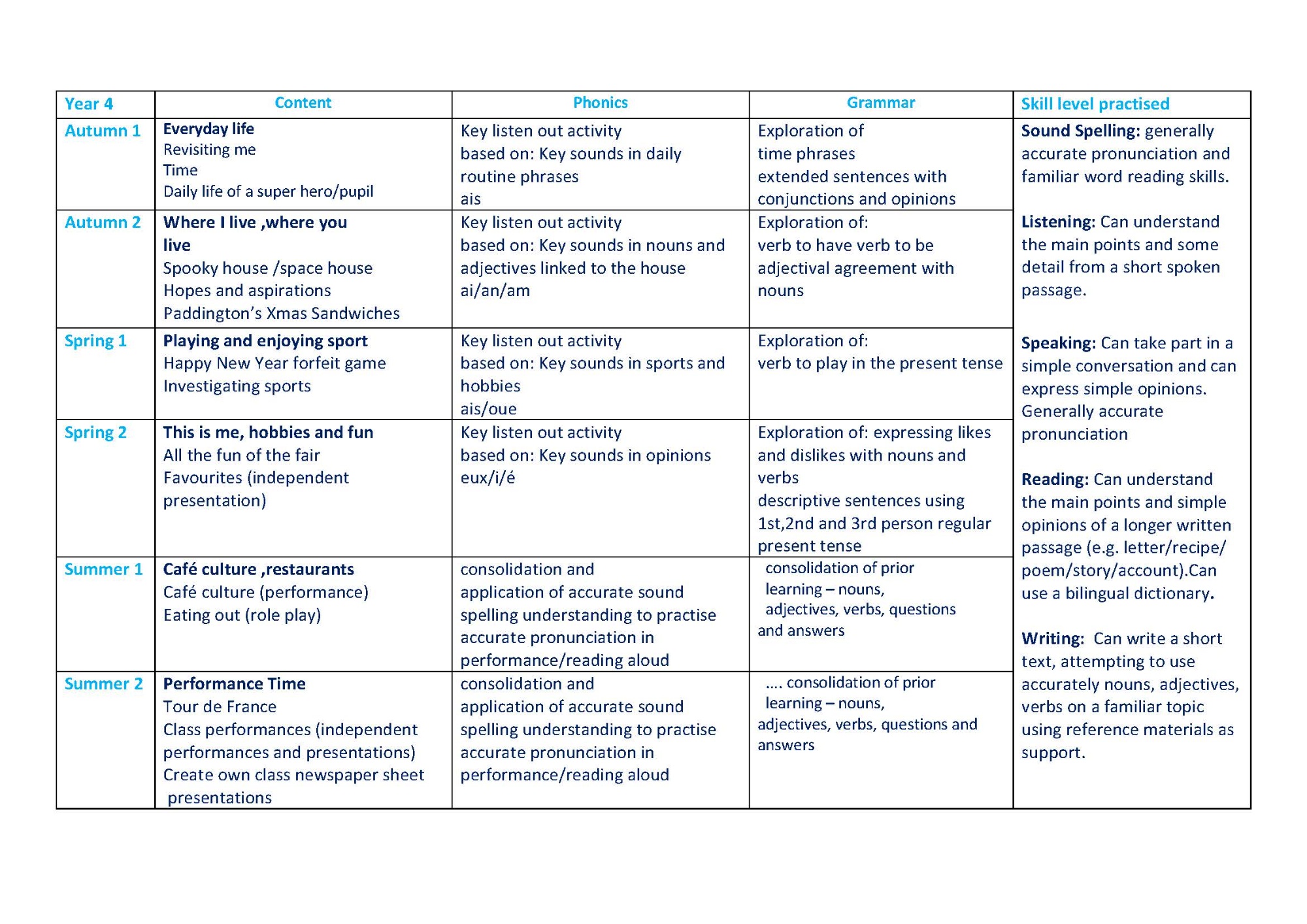
In 2025/26 year 3 and 4 will follow year 2 and year 5 and 6 year 4.
This pattern will continue. The group of pupils who start French in year 2 and finish the French scheme in year 5 will consolidate and secure their learning - we will liaise with the high schools and use the primary language extension materials.
Our curriculum Drivers in MFL
Reading
In French, we are learning to read another language. We are reading about the culture and customs of France. learners are given the opportunity to explore and play with words, phrases and fundamental grammatical skills that the French language is based on. The involvement of reading, speaking and listening activities challenge the pupils to step out of their comfort zone and build upon their self-esteem to speak in another language in front of their peers and their teacher. We encourage children to develop their critical thinking and strive to stimulate the children’s curiosity about language.
character
In Primary Languages, the curriculum develops learners awareness of cultural differences in other countries alongside British values. The learning of another language questions and widens learners concepts of what everyday life is like around the globe helping them to develop their knowledge of other cultures, as well as tolerance and understanding of difference.
Learning a new language requires resilience and courage. Mistakes are a part of learning. Learners work collaboratively to support each other within lessons.
Creativity
As learners acquire a wider vocabulary they are able to create dialogue and write their own versions of information presented. As part of learning we play with words and participate in games to aid recall.
IMPACT
Following the National Lockdowns in 2020 and 2021 assessment and observation indicated that pupils did not, as a group, have a core knowledge of French to draw on for speaking, reading or writing. Some children had accessed the work set during school closures, some had not. Following school closure in the academic year 20/21 the school had made the decision to defer starting whole class French teaching due to other priorities and to introduce anew scheme from September 21.
The impact of adopting the Primary Languages scheme this year has been that pupils are highly engaged with French Language learning and keen to participate in lessons. They are making strong progress.
Pupil feedback in 22/23 indicated that they do not feel thy have enough time to engage with new vocabulary so we are adapting lessons to take this into account in 23/24.
Special Educational Needs
French is taught to all children, whatever their ability, in accordance with the school curriculum policy of providing a broad and balanced education to all children. Teachers provide learning opportunities matched to the needs of children with learning difficulties.
Assessment, Recording and Reporting
All subjects there are three broad areas for assessment:
- Children’s knowledge and understanding
- How well children can use and apply their knowledge, understanding and skills at the end of a unit of work to complete an independent (of an adult) task or challenge.
- How well learners are developing habits for learning and character
Teachers assess learner’s work, their attitudes, increasing skills, knowledge and understanding, by making informal judgements as they observe them during lessons. This assessment enables planning to be tailored to meet learners needs. Assessment encompasses teacher, peer and self-assessment. In all subjects, opportunities for both Assessment for Learning and Assessment of Learning are built into provision. Learners are supported to reflect on their own learning and, age appropriately, to make judgements about their strengths and needs, beginning to plan how to make progress and set personal targets.
Baseline assessment, in order to understand pupils’ prior learning, is an essential part of planning to ensure new learning is relevant and progress can be assessed.
The learners work, in particular baseline assessments and end of unit assessments, which are recorded within learners’ workbooks are used to make decisions at the end of each unit, and at the end of each year, as to next learning steps and whether or not learners are making strong progress and are on track for end of key stage expectation.
Progress is recorded and reported to parents as part of the child’s annual school report.
Examples of tracking sheets are below.
Progress in French at Newton Burgoland
|
|
By the end of Y4 |
By the end of Y6 |
|
Listen attentively to spoken language and show understanding by joining in and responding |
listen attentively and understand more complex phrases and sentences |
Listen attentively and understand more complex phrases and sentences |
|
Identify specific sounds, phonemes and words |
Listen for specific words and phrases |
|
|
listen for specific words and phrases |
Understand the main points and simple opinions in a spoken story, song or passage |
|
|
Explore the patterns and sounds of language through songs, rhymes and link spelling of sound and meaning of words |
listen for sounds, rhyme and rhythm |
imitate pronunciation |
|
identify specific sounds/phonemes/words
|
identify specific sounds/phonemes/words |
|
|
focus on correct pronunciation and intonation |
Recite a short piece of narrative either from memory or by reading aloud from a text |
|
|
Engage in conversations; ask and answer questions; express opinions and respond to those of others; seek clarification and help |
prepare and practise a simple conversation reusing familiar vocabulary and structures (in new contexts) |
use spoken language confidently to initiate and sustain simple dialogues and conversations |
|
ask and answer questions on several topics
|
ask and answer questions on several topics |
|
|
devise and perform simple role plays) |
understand and express opinions |
|
|
ask and answer questions on several topics |
devise and perform simple role plays |
|
|
Speak in sentences, using familiar vocabulary, phrases and basic language structures |
prepare and practise a simple conversation reusing familiar vocabulary and structures (in new contexts) |
use spoken language confidently to initiate and sustain simple dialogues and conversations |
|
perform simple communicative tasks using single words, phrases and short sentences |
ask and answer questions on several topics |
|
|
Imitate pronunciation |
Retell using familiar language a sequence of events from a spoken passage containing complex structures |
|
|
identify specific sounds, phonemes, words. Imitate pronunciation |
Use time and/or sequencing structures in spoken sentences |
|
|
perform simple communicative tasks using single words/phrases and sentences |
understand and express opinions |
|
|
Develop accurate pronunciation and intonation, so that others understand …. |
develop accuracy in pronunciation |
identify specific sounds, phonemes, words. Imitate pronunciation |
|
perform simple communicative tasks using single words/phrases and sentences |
recite a short piece of narrative text by reading aloud |
|
|
memorise and present a short spoken text |
focus on correct pronunciation |
|
|
Present ideas and information orally to a range of audiences |
prepare and practise a simple conversation reusing familiar vocabulary and structures (in new contexts) |
prepare a short presentation on a familiar topic |
|
read a range of familiar written phrases |
memorise and present a short spoken text |
|
|
apply phonic and whole word knowledge of the new language in order to locate words in a reference source |
understand and express opinions |
|
|
attempt to recite a short piece of narrative by reading aloud from the text |
using familiar language and some unfamiliar language re-tell or present a story to an audience |
|
|
Read carefully and show understanding of words, phrases and simple writing |
read and understand a range of familiar phrases |
read and understand the main points and some detail from a short written passage (mainly familiar words) |
|
listen and respond to rhymes/songs/stories |
identify specific sounds, phoneme and words. Imitate pronunciation |
|
|
attempt to recite a short piece of narrative by reading aloud from the text |
read and understand a range of familiar phrases |
|
|
Appreciate stories, songs, poems and rhymes in the language |
read and understand a range of familiar phrases |
listen and respond to rhymes/songs/stories |
|
identify specific sounds phoneme and words. Imitate pronunciation |
read and understand the main points and some detail from a short written passage (mainly familiar words) |
|
|
Broaden their vocabulary and develop ability to understand new words that are introduced into familiar written material, and with the use of a dictionary |
read and understand a range of familiar phrases apply phonic and whole word knowledge of the new language in order to locate words in a reference source |
read and understand the main points and some detail from a short written passage (mainly familiar words) |
|
prepare and practise a simple conversation reusing familiar vocabulary and structures (in new contexts) |
read and understand a range of familiar and unfamiliar phrases |
|
|
write simple words and phrases using a model and some words from memory |
apply phonic and whole word knowledge of the new language in order to locate words in a reference source |
|
|
Write phrases from memory and adapt these to create new sentences to express ideas clearly |
write words and short sentences using a reference |
write words, phrases and sentence (using a reference) |
|
write word, phrases and short sentences using a ref |
Use time and sequencing structures in written sentences |
|
|
write simple words and phrases using a model and some words from memory |
experiment with the writing of words and phrases from memory |
|
|
Describe people, places, things and actions orally and in writing |
nouns/ gender and in singular and plural |
construct a short text e,g create a ppt/ presentation or short passage to give a description |
|
begin to explore agreement of adjectives |
Use time and sequencing structures in spoken sentences |
|
|
Understand basic grammar |
understand and use the question form “have you ..?” and give a positive/ negative response “I have/ haven’t” |
Revisit (extend) and explore use of conjunctions |
|
construct simple sentences using nouns, verb (to be) and an adjective |
Understand and use time phrases to give “o’clock” times |
|
|
listen attentively and understand more complex phrases and sentences |
explore and practise a regular present tense verb: “to play” |
|
|
Identify specific sounds, phonemes and words |
Explore and practise the accurate use of nouns, adjectives, conjunctions and verbs in present tense sentences |
French Knowledge organiser
To help practise at home use these Knowledge organisers
| year | Autumn 1 | Spring 1 | Summer 1 |
| 1 |
|
|
|
| 2 |
Excellent work in French







